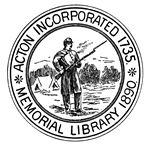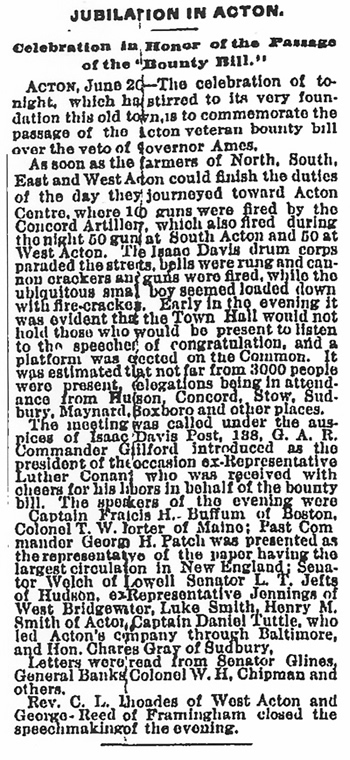 |
Acton Memorial Library |
Passage of the Acton Veteran Bounty Bill
The Boston Globe, June 30, 1887

JUBILATION IN ACTON
———
Celebration in Honor of the Passage of the “Bounty Bill.”
ACTON, June 20—The celebration of tonight, which has stirred to its very foundation this old town, is to commemorate the passage of the Acton veteran bounty bill over the veto of governor Ames.
As soon as the farmers of North, South, East and West Acton could finish the duties of the day they journeyed toward Acton Centre, where 100 guns were fired by the Concord Artillery, which also fired during the night 50 guns at South Acton and 50 at West Acton. The Isaac Davis drum corps paraded the streets, bells were rung and cannon crackers and guuns were fired, while the ubiquitous small boy seemed loaded down with fire-crackers. Early in the evening it was evident that the Town Hall would not hold those who would be present to listen to the speeches of congratulation, and a platform was erected on the Common. It was estimated that not far from 3000 people were present. delegations being in attendance from Hudson, Concord, Stow, Sudbury, Maynard, Boxboro and other places.
The meeting was called under the auspices of Isaac Davis Post, 138, G. A. R. Commander Guilford introduced as the president of the occasion ex-Representative Luther Conant who was received with cheers for his labors in behalf of the bounty bill. The speakers of the evening were Captain Francis H. Buffum of Boston, Colonel T. W. Porter of Maine; Past Commander George H. Patch was presented as the representative of the paper having the largest curculation in New England; Senator Welch of Lowell, Senator L. T. Jefts of Hudson, ex-Representative Jennings of West Bridgewater, Luke Smith, Henry M. Smith of Acton, Captain Daniel Tuttle, who led Acton's company through Baltimore, and Hon. Charles Gray of Sudbury.
Letters were read from Senator Glines, General Banks, Colonel W. H. Chipman [sic] and others.
Rev. C. L. Rhoades of West Acton and George
Reed of Framingham closed the speechmaking of the evening.
On the 1881-82 Acton bounty bill see:
Harold R. Phalen, History of the Town of Acton. Cambridge, Mass.: Middlesex Printing, Inc., 1954, pp. 227-233.
Henry L. Hosmer, The Town of Acton in the Civil War, 1861-1865. Tucson, AZ: The Author, 2001, p. 106.
In 1904 the Supreme Judicial Court of Massachusetts declared unanimously that the Bounty Bill was unconstitutional, citing the case of Mead vs. Acton, 139 Mass. 341, in which “it was manifest that the public welfare could not be promoted by the payment of the proposed bounties, and therefore a statute attempting to authorize such a payment by any one attempted to divert public funds to private uses and was void.” [The Boston Globe, September 25, 1904, page 21.]